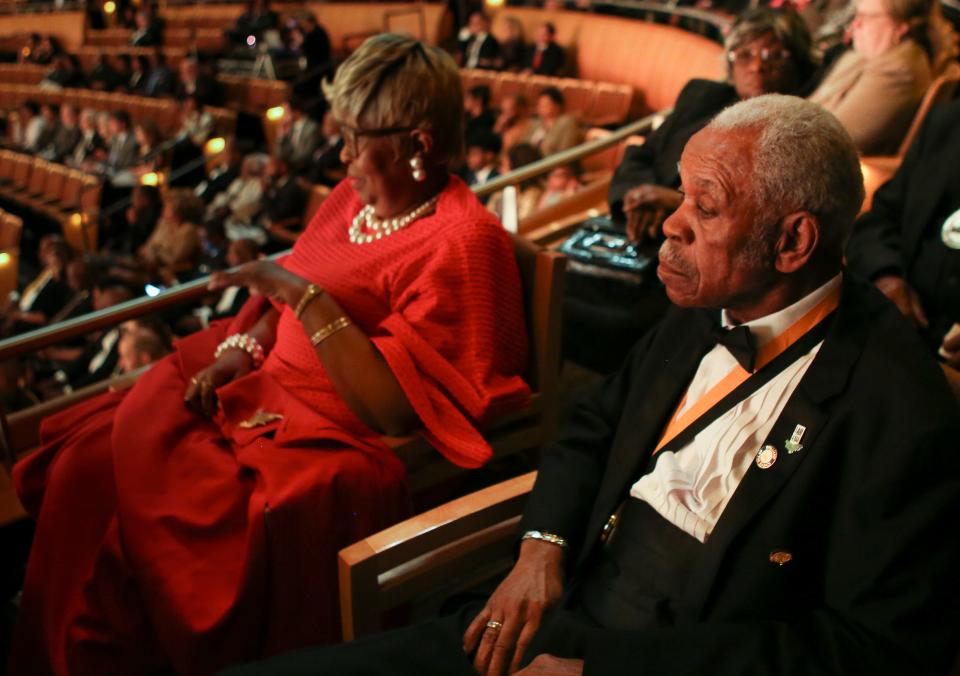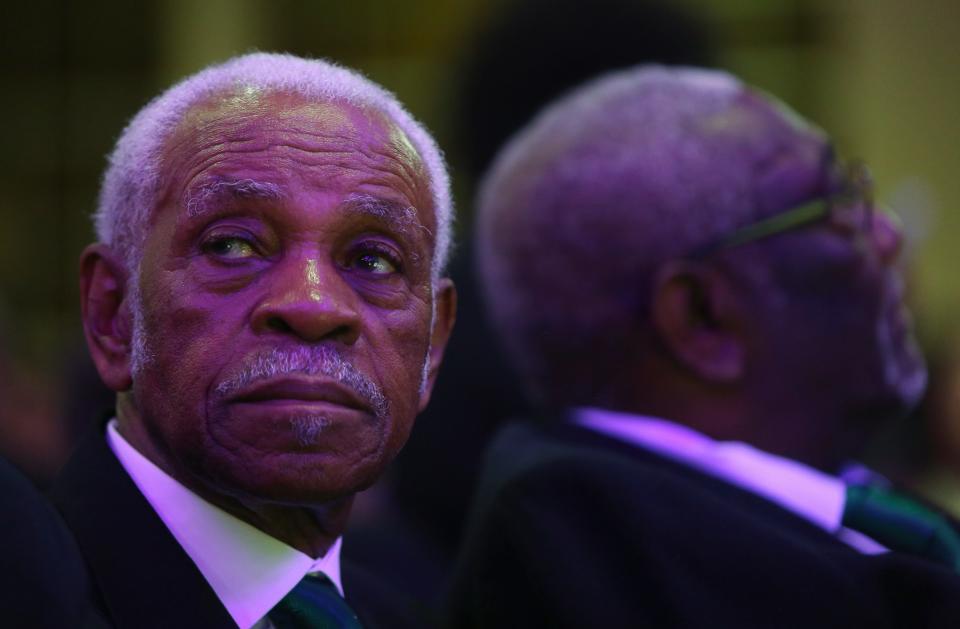Elmore Nickleberry, Memphis civil rights hero who marched with Martin Luther King, Jr., dies at 92
- Oops!Something went wrong.Please try again later.
- Oops!Something went wrong.Please try again later.
In 2018, Elmore Nickleberry flew to Los Angeles with other participants of the 1968 Memphis Sanitation Workers Strike, to be honored at the NAACP’s Image Awards. Traveling with them was Rev. Keith Norman, the senior pastor of First Baptist Church Broad, who at the time was president of the Memphis NCAAP branch. And though he had met Nickleberry before, Norman gained a more complete picture of him as they conversed on the trip.
Nickleberry, he could see, was a valiant, honorable man.
Here was a sanitation worker who had courageously stood up to white city leaders and partaken in one of the most consequential events in the Civil Rights Movement. Here was a fighter who had shown resilience in the face of unimaginable challenges but retained humility and a sense of humor. Here was a devoted and loving father who had summoned the strength to visit schools and be a positive influence after his daughter had been brutally murdered.
And here was a servant of the people who seemed to wholeheartedly believe Dr. Martin Luther King Jr.’s line, “Injustice anywhere is a threat to justice everywhere.” Whether cruelty affected him or not, Nickleberry was willing to combat it.
“Even after the sanitation workers’ strike, he continued to fight against injustice anywhere and everywhere, and use his voice against domestic violence and other things,” Norman said. “He was a citizen who wanted to see people live a godly life and a good life.”
In late December, Nickleberry’s own good, godly life came to an end, when he passed away at the age of 92. His legacy, however, isn’t likely to be forgotten.
Going on strike
As a Memphis sanitation worker in the 1960s, Nickleberry had to carry old, leaky garbage containers over his head. And as he did, maggots and ooze flowed onto his back.
“Lots of times, I had to use the same tub, and stuff used to come down on you. I couldn’t ride the bus home because I stunk so bad,” he told The Commercial Appeal in 2018. “I had to take a shower as soon as I got home.”
For Nickleberry and the other Black sanitation employees, working conditions were atrocious and wages were low. About 40% of them qualified for welfare, and many had to take extra jobs to make ends meet. The equipment and trucks they used were also outdated and at times dangerous. When two Black sanitation workers, Echol Cole and Robert Walker, were sitting in the back of a garbage truck on Feb. 1, 1968, an electrical short in the wiring caused the compressor to start running and crush them to death. The city government offered their families just a month’s worth of pay and $500 for funeral expenses.

Frustrations mounted, and Nickleberry and other workers decided they were done accepting unjust treatment. It was time to assert their manhood and dignity. On Feb. 12, 1968, about 1,300 sanitation workers went on strike, demanding better working conditions and higher pay. Mayor Henry Loeb, however, refused to recognize their union or give in to their demands, even as thousands of pounds of trash piled up throughout Memphis.
The strikers began picketing, attracting the attention of not just union organizers, but the NAACP and local Black ministers, who implored their congregants to boycott and march. Their work also drew the support of one of the most influential figures in U.S. history ― Dr. Martin Luther King Jr., who came to Memphis to peacefully protest with Nickleberry and the other strikers.
But the plans for peace weren’t shared by all.
At their first march, on Feb. 23, the sanitation workers were attacked by police wielding batons and mace. And during a March 28 demonstration ― which was led by King and members of the Southern Christian Leadership Conference ― some strike supporters began to smash windows. The police retaliated with mace, tear gas and gunfire, and hundreds were arrested, while a 16-year-old, Larry Payne, was fatally shot.

“I remember that violent march, during that time, they started throwing stuff, and the police started whupping us,” Nickleberry told The CA in 2018. “I got hit hard.”
Six days later, King was assassinated at the Lorraine Motel, further intensifying the strike. On April 16, 1968, it came to an end, with the City of Memphis recognizing the sanitation workers’ union and promising higher wages. This wasn’t a cure-all; Nickleberry and other employees continued to face a variety of issues, and as part of the agreement, they accepted social security benefits instead of a pension ― which led to a retirement pay gap when the city ultimately increased pension benefits. In an attempt to rectify this, the city opted to pay 26 surviving strikers $70,000 in grants in July 2017.
More: 'A social justice icon': Memphis activist Georgia King remembered for 'tireless advocacy'
But while Nickleberry and other strikers’ efforts didn’t make working conditions and pay perfect, it did help lead to greater economic mobility for Black workers. Recently, The New York Times published a story headlined “How the Memphis Sanitation Workers’ Strike Changed the Labor Movement.”
After the strike, Nickleberry remained a sanitation worker for decades, before finally retiring in 2018. His career lasted 63 years.
“I wanted to say, ‘Aren't there other jobs, or couldn't you have done something different?’” Norman recalled from their time together. “And he kept saying, ‘I had to care of my family, I love my family.’”
The events of 1990
That love for his family grew excruciating in 1990, when his youngest daughter, Tondalaya, was brutally murdered, 10 days before her 20th birthday. As the CA noted in 2018, her killer ― someone she thought was a friend ― strangled her with a telephone cord, cut her throat, and stabbed multiple times.
Nickleberry was devastated. But even as he mourned her loss and grappled with overwhelming pain, he tried to be a positive influence on youth so that others wouldn’t have to undergo similar experiences. He traveled from school to school, speaking to students.
“I tell them [kids] about how important it is to be careful who you hang out with,” Nickleberry told The CA. “If you see something that doesn’t look right, or if your friends are doing something that doesn’t look right, leave them alone. Respect yourself.”
He spoke to Norman about her death in Los Angeles, describing it as the “most deeply personal moment of his life.”
“That forever changed him,” Norman said. “And he used it as an opportunity to help others and to talk to others about… how it impacted his family.”
Now, Nickleberry has passed, and he’ll no longer be speaking to students, or fighting against injustice. But as we begin a new year, Norman believes there are lessons that can be learned from the life he lived.
More: Inside look: How Clayborn Temple's renovation is helping to 'keep the history alive'
“Causes are worth fighting for,” he said. “And causes are greater than you. Even after you’ve received what you thought you should receive, you still have to keep your eye on the prize.”
Former Memphis Mayor Jim Strickland said Nickleberry was a remarkable man who "served the public for over 60 years."
"His contributions to the sanitation strike and the pursuit of fair working conditions will be forever a part of Memphis history and a significant part of the America Civil Rights Movement."
As we reflect on his life, let us express our deepest condolences to his family, friends, and all those who stood alongside him in the pursuit of justice. May his legacy inspire future generations to continue the important work of advocating for the rights and dignity of workers everywhere," Strickland said.
This article originally appeared on Memphis Commercial Appeal: Elmore Nickleberry has died in Memphis at age 92

